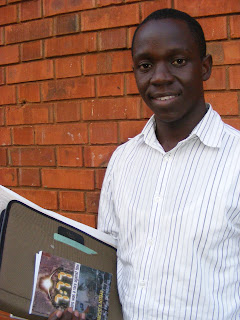DENNIS D. MUHUMUZA
The latest television show to watch out for is Jazz with Isaiah after the Friday 9pm NTV news. Its uniqueness is not in its exclusivity as a jazz show but in the little surprises and live performance skits that epitomize the show.
 |
| Isaiah Katumwa |
Did you for example know that Senior Presidential Advisor on ICT Dr. Ham Mulira is an accomplished pianist? Yes, he was Isaiah Katumwa’s guest last Friday as they shared their love and passion for jazz music. Turns out Dr. Mulira has played the piano since he was 10 but is so good at it that he has played for on stage for South African jazz legend Miriam Makeba!
Anyhow, Isaiah’s jazz show debunks the notion that jazz is a complicated genre that can only be appreciated by the equally sophisticated. For the three times I’ve watched this 30-minute show, I’ve fallen in love with jazz, because of the creativity, skilfulness and emotiveness that goes into this genre.
Isaiah opens his show with a piece from the classics; could be something from Grover Washington, or Hugh Masekela or even Isaiah himself; something intimate and wistful to warm up the soul, making you recline deeper in the sofa to enjoy the rest of the show. Soon, the men in the studio are chatting away in so relaxed a manner you forget this is an interview. There are lots of light moments too. For example when Isaiah asked Dr. Mulira what his best jazz piece of all time is, and he replied that it’s actually Isaiah’s My Joy, the host, visibly flattered said, “Are you sure you’re not just being polite to me?” It was a brilliant light moment.
The spontaneity of the host is also admirable. One moment he’s asking ‘what’s your take on jazz’ and next he’s saying “let’s play something!” When Dr. Muhira tickled the keys of the keyboard dexterously, a tantalized Isaiah picked up his saxophone, and soon the room was infused with poignant sounds that betrayed their emotional attachment to instrumental jazz.
This is the show that initiates the amateur into the real world of jazz; from the different styles and the emotion that is poured in, you learn that jazz, like good poetry, is purely a heart thing.
The show also has a segment where the interviewer gets to be interviewed! When he got his chance, Dr. Mulira asked what instrument besides the saxophone Isaiah would choose given chance. He said piano, because “it’s delicate especially when you want to hear something sensitive, quiet yet powerful,” and admitted how the seductive sounds of a piano sometimes bring tears to his eyes!
No doubt Jazz with Isaiah is bound to popurize jazz music in Uganda like never before. It’s a show that should teach station managers to pick show-hosts as passionate and knowledgeable in their areas of interest as is Isaiah about jazz.
--Saturday Monitor, August 20, 2011









